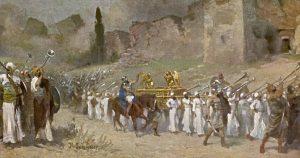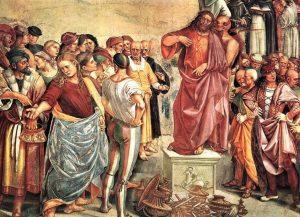To begin, let’s define what is meant by redemption. The world defines “redeemed” as being freed from captivity, released from blame or debt, or exchanged for something better. Our Bible adds God’s merciful response on behalf of His people to the definition of redeemed.
(Exodus 6:6)1NIV New International Version Translations – “Therefore, say to the Israelites: ‘I am the Lord, and I will bring you out from under the yoke of the Egyptians. I will free you from being slaves to them, and I will redeem you with an outstretched arm and with mighty acts of judgment.”
In Leviticus 25:47–49, we are told that redemption is part of God’s plan for the world. The New Testament further modifies the definition by adding Christ’s death on the cross. He paid for our sins and our debt to God to ensure our salvation (Mark 10:45). But what happens when there is an enemy that pursues our destruction and cannot be swayed toward peace? How does God handle such enemies? Let’s look back at a few examples to understand God’s view of redemption.
In the book of Joshua, after the death of Moses, Joshua becomes the leader of the Israelites, and God instructs him to lead the people into the Promised Land (Canaan) and conquer it. In the process, the Israelites are commanded to destroy the Canaanite cities and eliminate their inhabitants. One of the better-known stories is about the fall of Jericho, where the walls of the city are said to have collapsed after the Israelites marched around it for seven days. The Israelites were instructed not to take any spoils from cities in Canaan. The question of why God might be dissatisfied with Canaan becomes the real question about redemption. Why did God give up on Canaan?
The Bible provides descriptions of the practices of the Canaanite nations that were considered morally and spiritually objectionable from the perspective of God.
- (Leviticus 18:24-30) – This passage describes the detestable practices of the Canaanites, including various forms of sexual immorality, child sacrifice, and other immoral behaviors. The Israelites were warned not to engage in these practices.
- (Deuteronomy 18:9-12) – In this passage, the Israelites are warned against practicing the abominable customs of the people living in Canaan, including divination, sorcery, interpreting omens, witchcraft, and consulting with mediums and spiritists.
- (Deuteronomy 12:29-31) – The Israelites are cautioned not to inquire about how the Canaanites worshiped their gods and not to imitate their detestable practices, such as sacrificing their sons and daughters in a fire.
- (Jeremiah 7:30-34) – This passage describes the Valley of Ben Hinnom (Gehenna) and the practice of sacrificing children by fire, which was associated with the worship of the god Molek.
In theological terms, the conquest of Canaan is considered part of God’s plan to establish the Israelites in the land promised to them and to demonstrate God’s judgment on an immoral nation, the Canaanites. This is all part of the covenant between God and Abraham’s descendants. What angers God is not ours to define or debate. It is our task to understand God’s nature and what is considered righteous or sinful. An additional example, like Canaan, is found in Isaiah.
(Isaiah 10:6) – “I send him against a godless nation, I dispatch him against a people who anger me, to seize loot and snatch plunder, and to trample them down like mud in the streets.”
As a historical note: Canaan now encompasses the whole of present-day Israel, Gaza, Jordan, Palestine, the West Bank, and the southern parts of modern-day Lebanon and Syria. Judges 1:27–33 describes the failure of the Israelites to complete the conquest of the land by removing the Canaanites. Israel made the Canaanites slaves rather than doing as God had commanded and took advantage of the spoils of war, something that God forbid them to do.
As another example, the prophet Jonah’s mission to the city of Nineveh was to deliver a message of warning. The people of Nineveh, in response to Jonah’s message, repented, and God relented from the disaster He had planned for them. When a nation with a history of wrongdoing turns back to God, they receive His mercy. The Book of Nahum is a prophetic text reminding us that God’s mercy is not unconditional. Under the Assyrian Empire, Nineveh again became known for its military conquests and brutal treatment of conquered peoples. Nahum prophesies the downfall of Nineveh and describes the reasons for God’s judgment against Assyria. The Assyrians were depicted as a wicked and oppressive nation, and their capital city, Nineveh, was seen as a center of cruelty and violence. The prophet declares that God is against Nineveh because of its evil deeds and destroys the city.
The territory that forms the Assyrian homeland in our Bible is currently divided between present-day Iraq, Turkey, Iran and Syria.
- (Nahum 1:11–15): These verses speak of the wickedness of Nineveh, describing it as a city of plots and schemes. The Lord declares judgment on the city for its cruelty and oppression of other nations.
- (Nahum 3:1-7) – These verses further elaborate on the sins of Nineveh, highlighting its violence, deceit, and exploitation of other nations. The city is condemned for its immorality and idolatry.
The book of Nahum vividly describes the fall of Nineveh, with imagery of the city being besieged, breached, and ultimately destroyed. The destruction of Nineveh becomes a divine act of judgment, a consequence of the Assyrians’ cruelty and unrepentant ways.
In the New Testament, the theme of redemption and reconciliation is defined through the death and resurrection of Jesus Christ. The Christian message emphasizes that through faith and repentance, individuals and nations can find forgiveness and salvation. The message’s focus is on the transformative power of God’s grace and the possibility of redemption for those who turn to God. These stories remind us that God is active in His creation. He was active during the days of Joshua, the Canaanites, and the Assyrians in Nineveh. God is active today in our world, including the Middle East, Europe, and the United States.
Our world has enemies today. Some can be redeemed, and some cannot. God, however, is still in charge. Placing our faith and trust in God’s Truth continues to be the most important response to evil that humanity can make.
“It is the duty of all Nations to acknowledge the providence of Almighty God, to obey his will, to be grateful for his benefits, and humbly to implore his protection and favors.” ~ George Washington
Contemplations
- How important is “truth” in evaluating world events, our nation’s behaviors, and our enemies?
- Ideas to Explore: Truth from media, governments, educational institutions, etc.
- Is every act of war permissible?
- Ideas to Explore: The world seems to have a code that women and children should be spared the pains of war. That is rarely the case. How do you reconcile the indiscriminate slaughter of civilians, such as women and children?
- What if your enemy will never seek peace? Does this change any of the rules of war?
- Ideas to Explore: Does God permit us to defend ourselves? How does God permit peace to exist between those who cannot be reconciled?
- Is our God a God of peace, war, or both?
- Ideas to Explore: God loves His creation. To what extent will God permit destruction to ensure that peace can exist?
- Israel has existed for 3,000 years, spoken the same language, worshipped the same God, and sought lasting peace. Why do you think their right to exist is the basis of so much hatred?
- Ideas to Explore: Much of the world does not honor God. Most of the world is busy redefining what is sinful and what is not sinful. What does the Bible’s history tell us about conflict and reconciliation?
- 1NIV New International Version Translations









